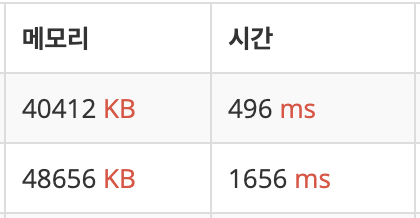문제 링크
import sys
from collections import deque
input = sys.stdin.readline
n, k = map(int, input().split())
q = deque()
q.append((0, n))
ans = int(1e9)
ans_cnt = 0
dp = [int(1e9)] * 100001
while q:
cnt, now = q.popleft()
if now == k:
if ans == int(1e9):
ans = cnt
ans_cnt += 1
elif cnt == ans:
ans_cnt += 1
continue
if cnt > ans:
break
else:
if now - 1 >= 0 and cnt + 1 <= dp[now - 1]:
q.append((cnt + 1, now - 1))
dp[now - 1] = cnt + 1
if now + 1 <= 100000 and cnt + 1 <= dp[now + 1]:
q.append((cnt + 1, now + 1))
dp[now + 1] = cnt + 1
if now * 2 <= 100000 and cnt + 1 <= dp[now * 2]:
q.append((cnt + 1, now * 2))
dp[now * 2] = cnt + 1
print(ans)
print(ans_cnt)BFS 알고리즘을 이용한 문제
배열을 이용해 해당 인덱스(위치)에 시간을 저장한다.
빠른 시간이 나오면 해당 값을 갱신시킨다.
그래서 먼저 배열 값을 10억으로 초기화해놓는다.
그 후 먼저 수빈이가 0초일 때, n의 위치에 있기 때문에 큐에 (0, n)을 넣는다.
큐에서 pop을 했을 때 해당 위치가 k인 경우, 다시 if문을 이용해 문제를 푼다.
초반에 heapq를 이용해서 풀다가, 시간초과가 발생했다.
## 12851. 숨바꼭질2
import sys
import heapq
input = sys.stdin.readline
n, k = map(int, input().split())
arr = []
heapq.heappush(arr, (0, n))
ans = int(1e9)
ans_cnt = 0
while arr:
cnt, now = heapq.heappop(arr)
# print(cnt, now)
if now == k:
if ans == int(1e9):
ans = cnt
ans_cnt += 1
elif cnt == ans:
ans_cnt += 1
continue
if cnt >= ans:
break
else:
if now - 1 >= 0:
heapq.heappush(arr, (cnt + 1, now - 1))
if now + 1 <= 100000:
heapq.heappush(arr, (cnt + 1, now + 1))
if now * 2 <= 100000:
heapq.heappush(arr, (cnt + 1, now * 2))
print(ans)
print(ans_cnt)아무래도 배열이 있다면 바로 배열 인덱스로 값에 접근할 수 있기 때문에 시간초과가 발생하지 않는 듯하다.
21.04.07 복습
## 12851. 숨바꼭질
import heapq
n, k = map(int, input().split())
INF = int(1e9)
dp = [INF for _ in range(100001)]
q = []
heapq.heappush(q, (0, n))
ans = INF
cnt = 0
while q:
sec, now = heapq.heappop(q)
if sec > ans:
break
if now == k:
if ans == INF:
ans = sec
cnt += 1
elif ans == sec:
cnt += 1
else:
break
if now - 1 >= 0 and dp[now - 1] >= sec + 1:
dp[now - 1] = sec + 1
heapq.heappush(q, (sec + 1, now - 1))
if now + 1 <= 100000 and dp[now + 1] >= sec + 1:
dp[now + 1] = sec + 1
heapq.heappush(q, (sec + 1, now + 1))
if now * 2 <= 100000 and dp[now * 2] >= sec + 1:
dp[now * 2] = sec + 1
heapq.heappush(q, (sec + 1, now * 2))
print(ans)
print(cnt)이번엔 dp와 heapq를 이용.
if now == k:
if ans == INF:
ans = sec
cnt += 1
elif ans == sec:
cnt += 1
else:
break처음에 이 조건문을 잘못 써서 78%에서 실패했다.
if now == k:
if ans == INF:
ans = dp[now]
cnt += 1
elif dp[now] == sec:
cnt += 1
else:
breakdp[now]와 sec은 항상 같은 값이다.
ans를 써야하는데 dp[now]로 쓰는 바람에,,
또한
if sec > ans:
break이 조건이 없어도 성공하지만

사진에서 볼 수 있듯이 시간을 훨씬 단축할 수 있다!
21.06.29 복습
import sys
import heapq
input = sys.stdin.readline
n, k = map(int, input().split())
q = []
heapq.heappush(q, (0, n))
INF = int(1e9)
dp = [INF for _ in range(100001)]
min_cnt = INF
answer_cnt = 0
while q:
cnt, n = heapq.heappop(q)
if n == k:
if min_cnt == INF:
min_cnt = cnt
answer_cnt = 1
elif cnt == min_cnt:
answer_cnt += 1
else:
break
if n - 1 >= 0 and dp[n - 1] >= cnt + 1:
dp[n - 1] = cnt + 1
heapq.heappush(q, (cnt + 1, n - 1))
if n + 1 <= 100000 and dp[n + 1] >= cnt + 1:
dp[n + 1] = cnt + 1
heapq.heappush(q, (cnt + 1, n + 1))
if n * 2 <= 100000 and dp[n * 2] >= cnt + 1:
dp[n * 2] = cnt + 1
heapq.heappush(q, (cnt + 1, n * 2))
print(min_cnt)
print(answer_cnt)시간초과 파티 ...

